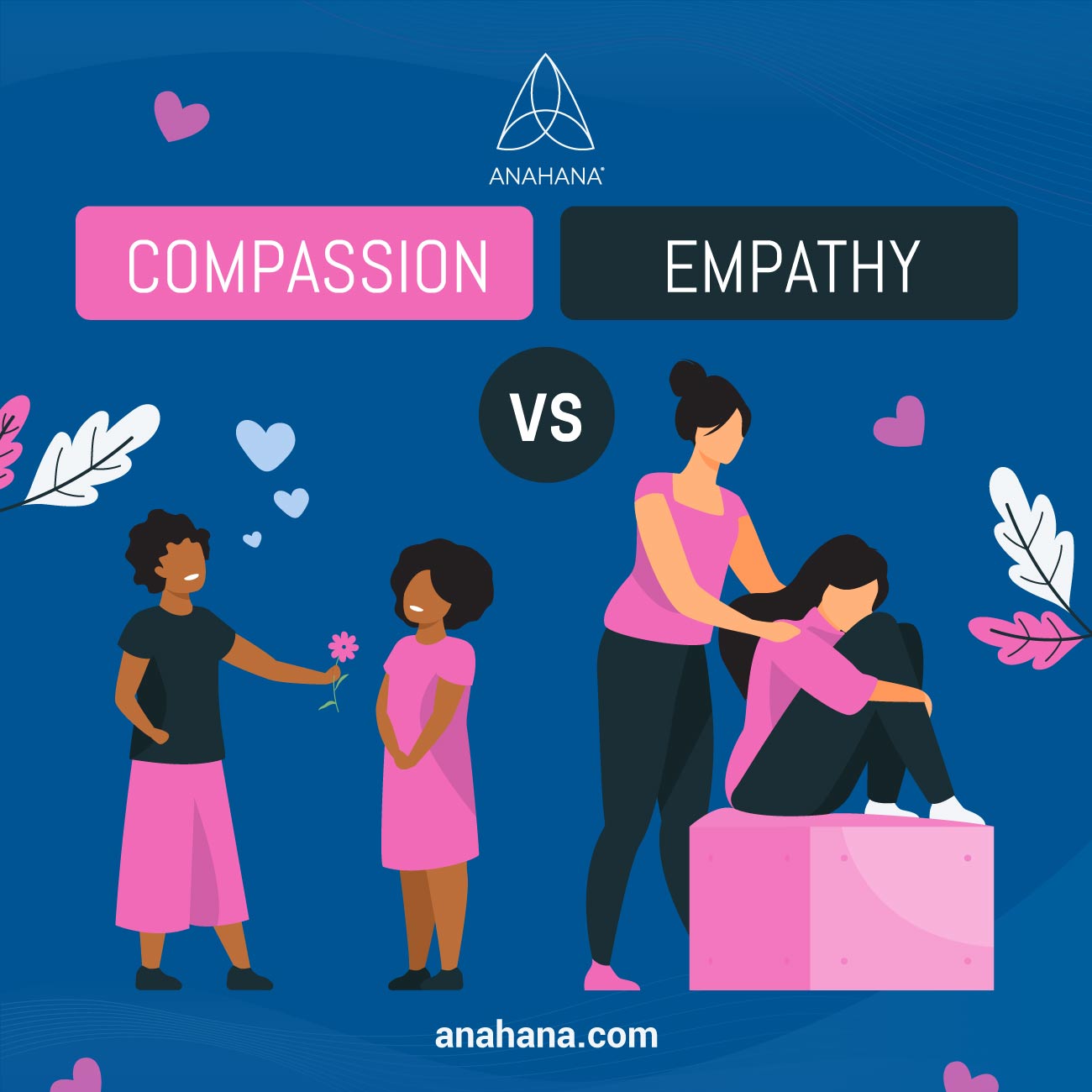
Table of Contents
Compassion is the act of feeling someone else’s pain and experiences and wanting to help them by taking action. Most people describe it as ‘putting oneself in someone else’s shoes.’ It is an action and emotion that brings humans closer to one another and makes people feel less alone in their suffering, no matter the cause.
What is Compassion?
The word compassion comes directly from Latin and translates to “to suffer together.” This defines compassion as feeling someone’s negative emotions and others' suffering. Then, with this feeling, compassion includes acting to help relieve another’s suffering.
Many people need clarification on what compassion means, versus similar concepts like sympathy, empathy and altruism. Sympathy and empathy are similar to compassion; they are the ability of an individual to feel and understand the emotions of others. What sets compassionate behavior apart from these is the desire and ability to act to help someone.
Many are also familiar with altruism; this is the selfless act of relieving someone else’s suffering, often motivated by compassion. Although often motivated by compassion, other factors can sometimes motivate it.
Human beings are inherently compassionate; watching someone suffer often brings up this emotion. Science has confirmed that compassion is an evolutionary necessity. When feelings of compassion arise, a person’s heart rate slows, bonding hormones like oxytocin are released, and brain regions show empathy, care, and pleasure. All of this results in wanting to help those suffering to relieve their pain.
Types of Compassion
Compassion often reveals itself in two primary forms: compassion for others and self-compassion. The distinction lies in whom the compassion is directed towards.
Compassion Towards Others
Compassion towards others is a straightforward concept. It involves feeling someone’s pain and suffering and having the desire to alleviate it through our own actions. This type of compassion is evident in both grand gestures and small acts of kindness; charitable donations, volunteering at a local shelter, or lending an empathetic ear to a friend in need.
As humans, we are inherently wired to alleviate the distress of others because we understand how burdensome and isolating certain emotional experiences can be. While compassion may come more naturally to some, practicing it is a skill that can be cultivated through practice.
Self-Compassion and How We Talk To Ourselves
Self-compassion, although less acknowledged, is equally vital, especially in a world where many experience compassion fatigue. As humans, we often forget that we, too, deserve compassion. It can be challenging to extend the same kindness and understanding to ourselves as we would to a friend or loved one facing difficulties.
Self-compassion involves treating oneself with the same kindness, care, and understanding one would offer to others in distress. It encompasses self-kindness, recognizing our shared humanity, and embracing mindfulness in moments of struggle.
“The simple act of meditating and sitting with your negative feelings non-judgementally often has the counterintuitive effect of making them go away,” – Dr. Laurie Santos
Research indicates that self-compassionate people tend to experience greater happiness, life satisfaction, and motivation. They also cultivate healthier relationships and exhibit better physical health, with lower levels of anxiety and depression.
Embracing self-compassion during challenging times serves as a powerful tool for building resilience. By nurturing a compassionate inner dialogue, individuals can navigate life's adversities—whether it be navigating a divorce, facing financial struggles, or embarking on a career change—with a greater sense of ease and grace.
How to Practice Compassion

To cultivate compassion in our everyday lives is a gradual process—one that requires patience and gentleness with oneself. Here are some practices that can help us access and feel compassion:
Loving-Kindness Meditation
Loving Kindness Meditation, or Metta Meditation, is a powerful practice that fosters compassion for both ourselves and others. It involves reciting phrases of loving-kindness towards oneself and gradually extending them to loved ones, acquaintances, and even to those with whom we may have difficulties.
Incorporating phrases like "May I be open to self-kindness" into our morning routine can set a compassionate tone for the day ahead.
“I often like to set the grounds of heart practices with this earthy body of ours, softening in ways so we can actually feel embodied Metta, using the imagery and felt sense of a smile.
So, I invite you to do that by first envisioning the curve of a smile spreading through a great, open, brilliant blue sky—sensing that openness and vastness of a smile spread through the sky. And sensing that your mind can merge with that sky…the top of your head opens out…and just sense that sky-like mind of awareness filled with the curve of a smile…the openness and the receptivity and brightness of that mind…” Tara Brach, Phd; Tonglen: Radical Compassion.
Soften Your Inner Critic
Many of us are weighed down by the heavy feelings of not being enough or believing that there is something inherently wrong with us. It is important to recognize that these experiences are not a sign of us being flawed or bad; rather, they are common manifestations of suffering in our culture.
When we notice the voice of self-judgment arising within us, we can gently inquire: What would being kind to myself at this moment look like? By acknowledging and loosening the grip of our inner critic, we pave the way for self-compassion to flourish.
Accepting Rather Than Avoiding Difficult Emotions
Picture our emotions as weather patterns—constantly shifting and evolving, much like the sky above. Acceptance and Commitment Therapy (ACT) offers profound insights into how we can navigate the storms of our inner landscape.
In the practice of acceptance, we're not asked to embrace negative self-beliefs or wallow in despair. Rather, acceptance invites us to acknowledge and be present with our emotions, whatever they may be. It's about recognizing the validity of our feelings without judgment or resistance.
When we accept difficult emotions, we create space for self-compassion to take root. Instead of struggling against the tide of our emotions, we learn to ride the waves with grace and resilience. By facing our inner storms head-on, we discover the strength and courage within ourselves to weather life's challenges.
“Finding the good inside can often come from asking ourselves one simple question: “What is my most generous interpretation of what just happened?”― Becky Kennedy, Good Inside: A Guide to Becoming the Parent You Want to Be.
In the embrace of acceptance, we find freedom—the freedom to be fully ourselves, flaws and all. And in that freedom, we discover the boundless capacity of the human heart to heal and grow.
Connect and Share With Others
Connecting and sharing our experiences with others can be profoundly validating. It reminds us that our feelings of inner criticism are shared by many, alleviating the burden of feeling isolated in our struggles. Through compassionate connection, we not only find solace but also promote healing and understanding.
Benefits of Compassion
Cultivating compassion isn't just a personal endeavor; it has far-reaching benefits for ourselves and society as a whole:
A Compassionate Brain
Research indicates that practicing compassion can have a powerful effect on our brain and emotional state. Studies show that acts of compassion activate brain regions associated with care and social connection, leading to an increase in positive emotions.
What's exciting is that compassion isn't fixed; it can be developed and strengthened through practice, regardless of age (a process known as neuroplasticity). Engaging in compassionate actions and thoughts can enhance our emotional resilience and foster a deeper sense of connection with others.
Creating a Work Culture of Caring
Compassion plays a crucial role in fostering a supportive and positive workplace culture. Studies suggest that practices like loving-kindness and compassion meditation can reduce stress and burnout among employees.
By incorporating compassion into the workplace, organizations can promote better mental health, improve job satisfaction, and enhance interpersonal relationships among colleagues. Compassionate leadership and empathy create an environment where employees feel valued and supported.
Social Health and Collective Well-Being
Social health is about nurturing meaningful connections, fostering empathy, and building supportive networks within our communities. Compassion serves as the cornerstone of social well-being, promoting empathetic connections, creating a culture of caring, and enhancing collective well-being.
By prioritizing compassion in our interactions and relationships, we create spaces where empathy, kindness, and understanding flourish, contributing to a more compassionate world.
Physical Health
Research suggests that compassion isn't just good for our mental health; it can also benefit our physical health. Studies have found that people who regularly practice compassion experience lower levels of inflammation and have better cardiovascular health.
Acts of kindness and compassion trigger the release of feel-good hormones in the body, which can boost our overall health and well-being. By fostering compassion in our daily lives, we not only strengthen our connections with others but also promote better health for ourselves.
Compassion Vs. Codependency
In our interactions with others, understanding the difference between compassion and codependency is vital for nurturing meaningful connections. Although they may seem alike, they originate from distinct motivations and can significantly impact our well-being and relationships. Let's explore how you can tell them apart:
What Drives Your Helping Nature?
Reflect on why you feel compelled to support or assist others. Are you genuinely motivated by a desire to alleviate their suffering and promote their well-being? Or do you find yourself constantly trying to fix their problems to validate your own self-worth? Asking yourself these questions can shed light on your true intentions and help you understand the source of your actions.
Journal Prompt
Recall a recent moment when you offered support or assistance to someone you care about. What prompted you to lend a helping hand? Take a moment to embrace the feelings that arose within you during that interaction. Was there a sense of warmth and connection as you reached out, or did other emotions come to the surface?
Establishing Healthy Boundaries
“Compassionate people ask for what they need. They say no when they need to, and when they say yes, they mean it. They're compassionate because their boundaries keep them out of resentment,”― Brené Brown, Rising Strong: The Reckoning. The Rumble. The Revolution.
Think about the boundaries you set in your relationships. Are you able to assert your needs and priorities while also supporting others? Or do you struggle to define boundaries, often feeling overwhelmed or dependent on others for validation? Understanding and maintaining healthy boundaries is key to fostering balanced and respectful relationships.
Compassionate people:
-
Openly express what they need in a kind and honest way
-
Are okay with saying no if they have to, respecting their own limits and needs
-
Keep their word and commitments
Journal Prompt
Think back to a time when you felt your boundaries were tested in a relationship. How did you navigate that situation? Reflect on the feelings of vulnerability or strength that emerged as you stood firm in your boundaries. Consider the ways in which you honor your own needs while also maintaining connections with others.
Managing Emotional Challenges
Consider how you handle emotional stress and adversity within your relationships. Do you find yourself emotionally drained by others' problems, or are you able to offer support while still caring for your own well-being? Exploring your emotional resilience can help you recognize when you need to prioritize self-care and set limits on the support you provide to others.
Journal Prompt
Close your eyes and bring to mind a moment when you felt overwhelmed by someone else's emotions. As you revisit that experience, notice the sensations in your body and the emotions that arise within you. Take a deep breath and gently explore the self-care practices that brought comfort and solace during challenging times. What gentle reminders of resilience do you find within yourself?
The Difference Between Compassion and Empathy

The terms empathy and compassion have often been used interchangeably. However, emerging evidence highlights the importance of discerning between these two concepts, particularly in understanding resilience in the face of suffering.
Empathy refers to the ability to feel what others feel, to resonate with their emotions on a deep level. Compassion, on the other hand, encompasses empathy but goes beyond it. It includes a sense of caring and concern that drives one to take action to alleviate another's suffering. The essence of compassion lies in the heartfelt desire to help and support others in their time of need.
Compassion, often defined as "to suffer together," taps into our evolutionary potential for affiliative care and mutual support. It reflects our innate capacity to tune in to others' experiences and extend genuine care and kindness. This capacity for compassion holds the promise of creating a more empathetic and connected world.
It's important to note that empathy, while a valuable trait, doesn't entail solely catering to others' needs at the expense of our own. Recognizing and respecting our own emotions and needs is crucial for maintaining a connected relationship with ourselves.
True empathy involves understanding and validating others' experiences while also honoring our boundaries and prioritizing self-care. Embracing this balance allows for more genuine and sustainable connections built on mutual respect and reciprocity.
Frequently Asked Questions
What does it mean to be a compassionate person?
Being more compassionate means relating to others’ feelings and experiences and taking steps to improve these. It is to feel deeply for someone as they experience hardships throughout life and to act to support them in any way. Most importantly, to be compassionate is to do these things selflessly.
How to be a more compassionate person?
Being a more compassionate person comes with practice. It is important to recognize that suffering exists for everyone. Things like speaking with kindness to others and oneself, apologizing for mistakes made, listening without judgment, and offering help to those in need are great small steps to take to be more compassionate.
Can there be too much compassion?
While compassion is generally regarded as a positive trait, it's important to maintain boundaries and avoid becoming overwhelmed by others' suffering. Compassion fatigue, burnout, and emotional exhaustion can occur when individuals consistently prioritize others' needs over their own well-being. Practicing self-care and setting healthy boundaries are essential for maintaining a balanced and sustainable approach to compassion.
References
Compassion Definition | What Is Compassion
How to Be More Compassionate: A Mindful Guide ...
Living BIG: Setting Boundaries When You’re a People Pleaser | Quiet Connections
Compassion vs. Empathy: Their Meanings and Which to Use
Disclaimer
The contents of this article are provided for informational purposes only and are not intended to substitute for professional medical advice, diagnosis, or treatment. It is always recommended to consult with a qualified healthcare provider before making any health-related changes or if you have any questions or concerns about your health. Anahana is not liable for any errors, omissions, or consequences that may occur from using the information provided.

By: Anahana
The Anahana team of researchers, writers, topic experts, and computer scientists come together worldwide to create educational and practical wellbeing articles, courses, and technology. Experienced professionals in mental and physical health, meditation, yoga, pilates, and many other fields collaborate to make complex topics easy to understand. Anahana is also home to specialists in crystals, tarot, angel numbers, astrology, life path numbers, zodiac signs, and horoscopes. By combining evidence-based wellness with spiritual and energetic practices, the team offers clear, trustworthy guidance for both mind-body health and modern spirituality.